Customer Service Strengths are the special skills and qualities that help people or teams serve customers well. These strengths might include being good listeners, having patience, or knowing a lot about the products or services being offered. For example, someone with strong customer service strengths might be really good at calming down upset customers or finding quick solutions to problems.
These strengths are important because they make customers feel valued and happy with the service they receive. By recognizing and using these strengths, businesses can provide better customer experiences and build stronger relationships with their customers.
10 Customer Service Strengths Fueling Businesses in 2024
1. Effective Communication
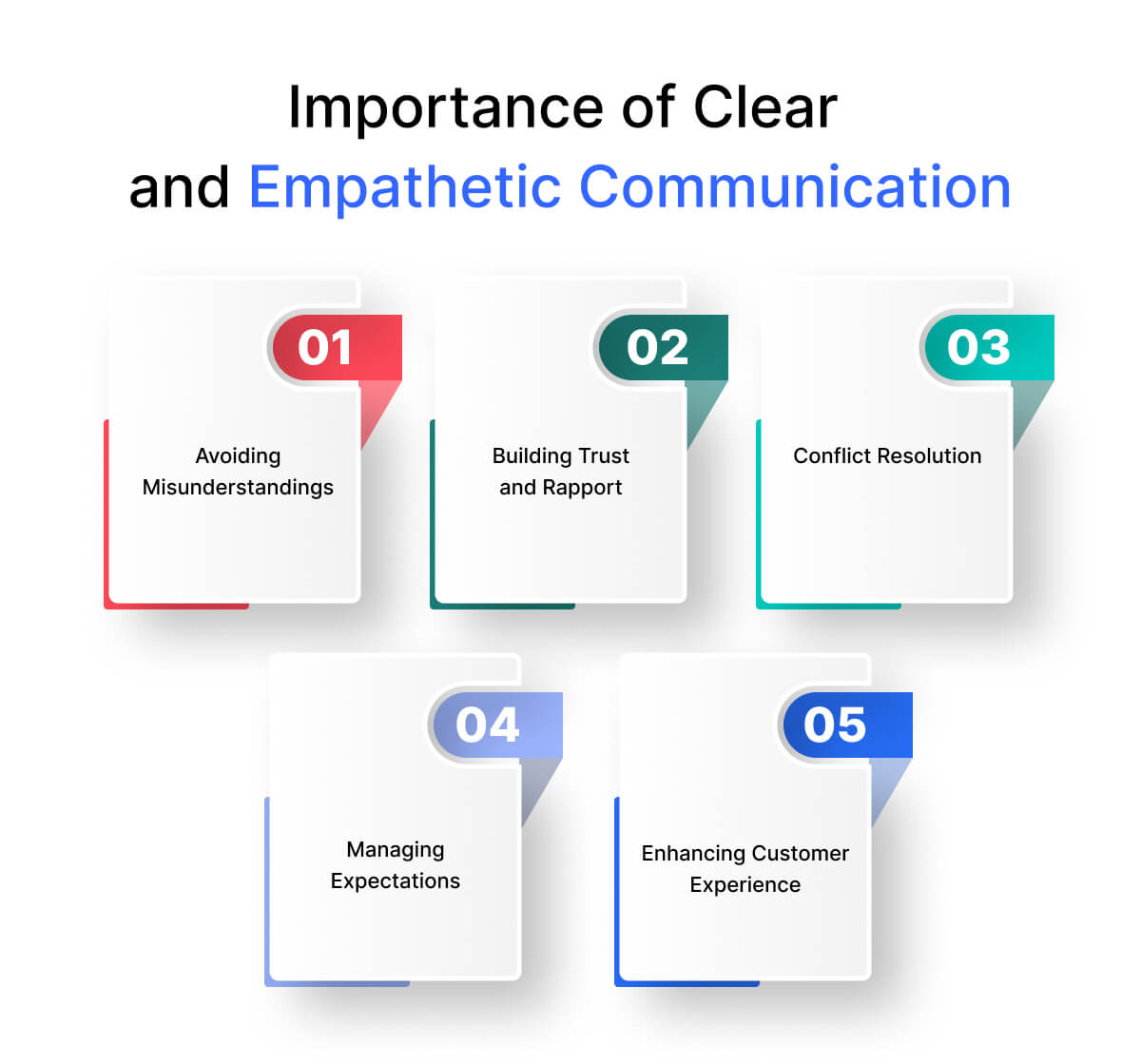
- Avoiding Misunderstandings: Clear communication ensures that customers and service representatives are on the same page, minimizing the risk of misunderstandings. By using concise and unambiguous language, businesses can prevent confusion and address customer needs accurately.
- Building Trust and Rapport: Empathetic communication demonstrates a genuine concern for the customer’s situation. When service representatives actively listen, acknowledge emotions, and respond with empathy, it fosters trust and builds a positive rapport with customers. This, in turn, strengthens customer loyalty and satisfaction.
- Conflict Resolution: Clear and empathetic communication plays a crucial role in resolving conflicts. When customers feel heard and understood, they are more likely to be receptive to finding a mutually beneficial solution. Effective communication skills enable service representatives to navigate difficult conversations, diffuse tension, and reach resolutions that leave customers feeling valued.
- Managing Expectations: Clear communication helps manage customer expectations from the outset. By setting realistic expectations about product or service features, pricing, timelines, and potential limitations, businesses can prevent dissatisfaction and enhance customer satisfaction. Transparent communication builds trust and prevents customer frustration.
- Enhancing Customer Experience: Clear and empathetic communication creates a positive customer experience. When customers feel that their needs are understood and addressed promptly, they are more likely to have a favorable perception of the brand. Effective communication fosters customer loyalty, encourages repeat business, and generates positive word-of-mouth referrals.
Correlation between Communication Skills and Customer Loyalty
- According to a study by Glance Networks, 78% of consumers consider competent customer service representatives who communicate clearly as the most critical factor in their satisfaction and loyalty.
- Research conducted by Deloitte reveals that customers are 4 times more likely to defect to a competitor if they experience a problem that is not resolved with effective communication.
- A report by NewVoiceMedia states that 75% of customers believe it takes too long to reach a live agent when communication channels are inefficient, leading to frustration and potential loss of loyalty.
- A survey conducted by Microsoft found that 96% of customers believe that the quality of customer service is influenced by the agent’s ability to understand and empathize with their needs.
- According to a study by Accenture, 89% of customers become frustrated when they need to repeat their issues to multiple representatives. Effective communication skills that ensure accurate information transfer can significantly reduce customer frustration and enhance loyalty.
These statistics underscore the critical role of communication skills in customer loyalty. Businesses that prioritize clear and empathetic communication can expect improved customer satisfaction, increased loyalty, and ultimately, long-term success.
2. Active Listening
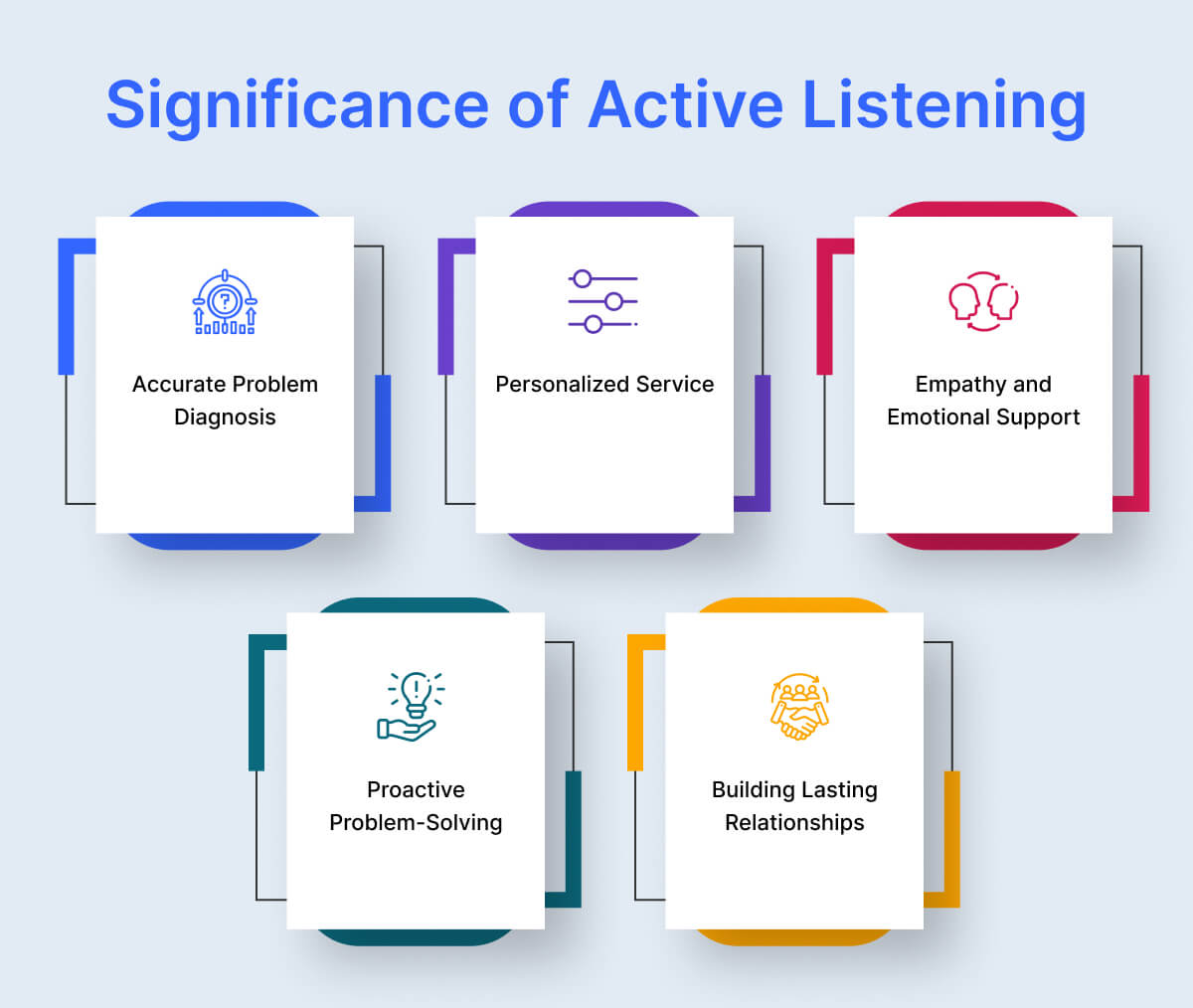
- Accurate Problem Diagnosis: Active listening allows service representatives to grasp the customer’s concerns fully. By attentively listening to the customer’s description of the problem, asking relevant questions, and seeking clarifications, representatives can accurately diagnose the issue and provide appropriate solutions.
- Personalized Service: Active listening enables service representatives to understand each customer’s unique needs and preferences. By actively engaging in the conversation, acknowledging specific requirements, and tailoring solutions accordingly, businesses can deliver personalized service that resonates with the customer, fostering loyalty and satisfaction.
- Empathy and Emotional Support: Active listening goes beyond words; it encompasses understanding and empathizing with the customer’s emotions. By attentively listening to their frustrations, concerns, and experiences, service representatives can offer genuine emotional support, making customers feel valued and cared for.
- Proactive Problem-Solving: Active listening helps service representatives identify underlying issues and anticipate potential problems. By paying attention to subtle cues, suggestions, and feedback, businesses can proactively address concerns, prevent future issues, and provide a proactive customer experience.
- Building Lasting Relationships: Active listening is the foundation for building strong, lasting relationships with customers. When customers feel heard, understood, and appreciated, they are more likely to develop a sense of loyalty toward the brand. Active listening fosters trust, strengthens relationships, and establishes the groundwork for long-term customer satisfaction.
Positive Outcomes of Active Listening
- According to a study by Harvard Business Review, customers who feel their service provider actively listens to their needs are 4.6 times more likely to be satisfied.
- A report by American Express found that 75% of customers appreciate when service representatives demonstrate active listening skills, leading to increased loyalty and recommendations.
- Research by Gartner states that by 2023, organizations that prioritize proactive and personalized customer service, including active listening, will outperform competitors by 20% in customer satisfaction metrics.
- A study conducted by Forbes found that 70% of customers who feel valued and heard through active listening are more likely to remain loyal to the company.
- According to a survey by Zendesk, 86% of customers expect businesses to actively listen and understand their concerns, highlighting the increasing importance of active listening as a customer service skill.
These statistics demonstrate the significant impact of active listening on customer experience. By actively listening, businesses can foster customer satisfaction, loyalty, and long-term success in a competitive marketplace.
3. Problem-Solving Abilities
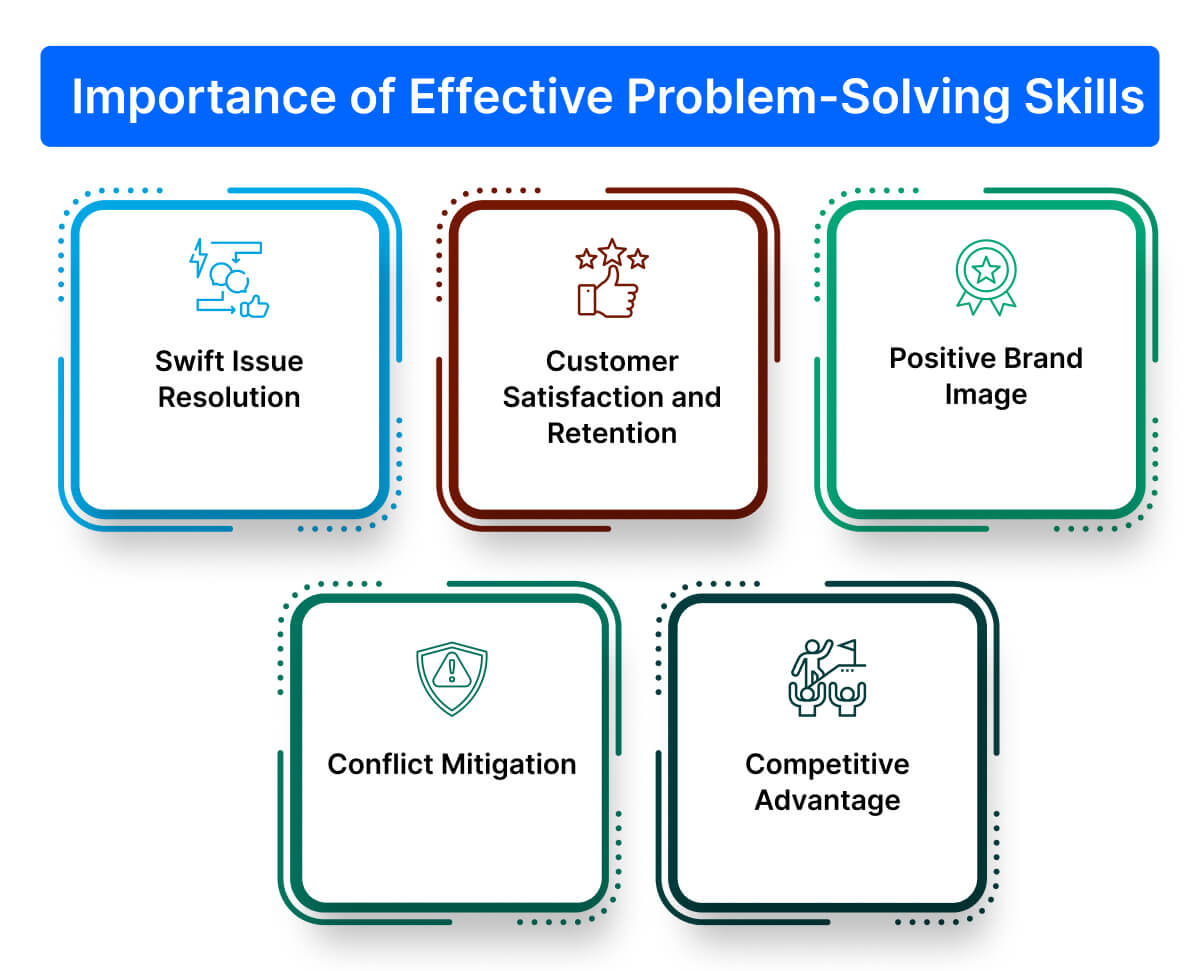
- Swift Issue Resolution: Effective problem-solving skills enable customer service representatives to address customer concerns promptly, minimizing frustration and maximizing satisfaction. By swiftly identifying and resolving issues, companies can build a reputation for reliability and responsiveness.
- Customer Satisfaction and Retention: When customers experience efficient problem resolution, they feel valued and supported. This leads to higher levels of customer satisfaction, increased loyalty, and ultimately, improved customer retention. By proactively solving problems, businesses can strengthen their relationships with customers and foster long-term loyalty.
- Positive Brand Image: Companies known for their effective problem-solving abilities develop a positive brand image. Customers perceive them as trustworthy, reliable, and committed to resolving issues. This reputation not only attracts new customers but also contributes to positive word-of-mouth referrals, leading to business growth and success.
- Conflict Mitigation: Effective problem-solving skills empower customer service professionals to navigate conflicts and disagreements with customers in a constructive manner. By actively listening, understanding the underlying concerns, and proposing viable solutions, they can diffuse tension and turn potentially negative situations into positive experiences.
- Competitive Advantage: In a saturated marketplace, where products and services often appear similar, effective problem-solving skills can provide a distinct competitive advantage. By demonstrating a commitment to customer satisfaction and going above and beyond to resolve issues, companies can differentiate themselves from competitors, attracting and retaining customers.
Correlation Between Efficient Problem-Solving and Customer Loyalty
- According to a study by American Express, 78% of consumers have bailed on a transaction or not made an intended purchase due to poor customer service. Efficient problem-solving skills directly contribute to positive customer experiences and reduce the likelihood of customer churn.
- Research by Zendesk reveals that 72% of customers with positive problem-solving experiences share their stories with six or more people. Conversely, customers who experience poor problem resolution are more likely to share their negative experiences, potentially impacting brand reputation and customer acquisition.
- A survey conducted by Microsoft found that 96% of consumers believe customer service is a crucial factor in their choice of loyalty to a brand. Effective problem-solving skills are instrumental in delivering exceptional customer service, thereby influencing customer loyalty and retention.
- In a study conducted by Bain & Company, it was discovered that increasing customer retention rates by just 5% can lead to a 25% to 95% increase in company profits. Effective problem-solving plays a vital role in customer retention, contributing directly to business growth and profitability.
- According to the Harvard Business Review, customers who have their problems resolved efficiently and effectively become more loyal than they were before the issue occurred. Effective problem-solving not only restores customer confidence but also has the potential to create even stronger customer relationships based on trust and satisfaction.
4. Empathy and Emotional Intelligence
- Fostering Understanding: Empathy allows us to put ourselves in the shoes of the customer, understanding their needs, concerns, and emotions. It helps us to connect on a deeper level and respond with genuine care and concern.
- Effective Communication: Emotional intelligence enables us to recognize and understand the emotions of others, allowing us to communicate in a way that is sensitive, compassionate, and tailored to individual needs. It helps us to navigate difficult conversations and resolve issues with empathy and respect.
- Conflict Resolution: Empathy and emotional intelligence play a vital role in resolving conflicts. By understanding the emotions and perspectives of both the customer and the service provider, we can find common ground, address concerns, and reach mutually beneficial resolutions.
- Building Trust and Loyalty: When customers feel understood and valued, they develop a sense of trust and loyalty towards the company. Empathy and emotional intelligence contribute to building genuine connections, which are the foundation of long-lasting relationships.
- Creating Memorable Experiences: By incorporating empathy and emotional intelligence into every interaction, we can create memorable experiences for customers. When they feel heard, supported, and understood, they are more likely to remember and share positive experiences with others.
Influence of Empathy on Customer Loyalty and Word-of-Mouth Referrals
- According to a study by Harvard Business Review, customers who have a positive emotional experience with a company are more likely to remain loyal, with 74% likely to repurchase and 71% likely to recommend it to others.
- A report by PwC found that 73% of customers consider customer experience a crucial factor in their purchasing decisions, and empathy is a significant driver of positive customer experiences.
- In a survey conducted by Zendesk, 87% of customers stated that they would be willing to pay more for a better customer service experience, which includes empathetic interactions.
- A study by NewVoiceMedia revealed that 59% of customers would switch to a competitor if they felt a company showed a lack of empathy during their interactions.
- According to Temkin Group, companies that prioritize customer experience and display empathy outperform their competitors by an average of 16% in revenue growth.
These figures ensure how valuable Empathy and emotional intelligence are in the creation of memorable customer experiences. By embracing these qualities, businesses can enhance customer satisfaction, loyalty, and generate positive word-of-mouth referrals, ultimately leading to long-term success.
5. Product Knowledge
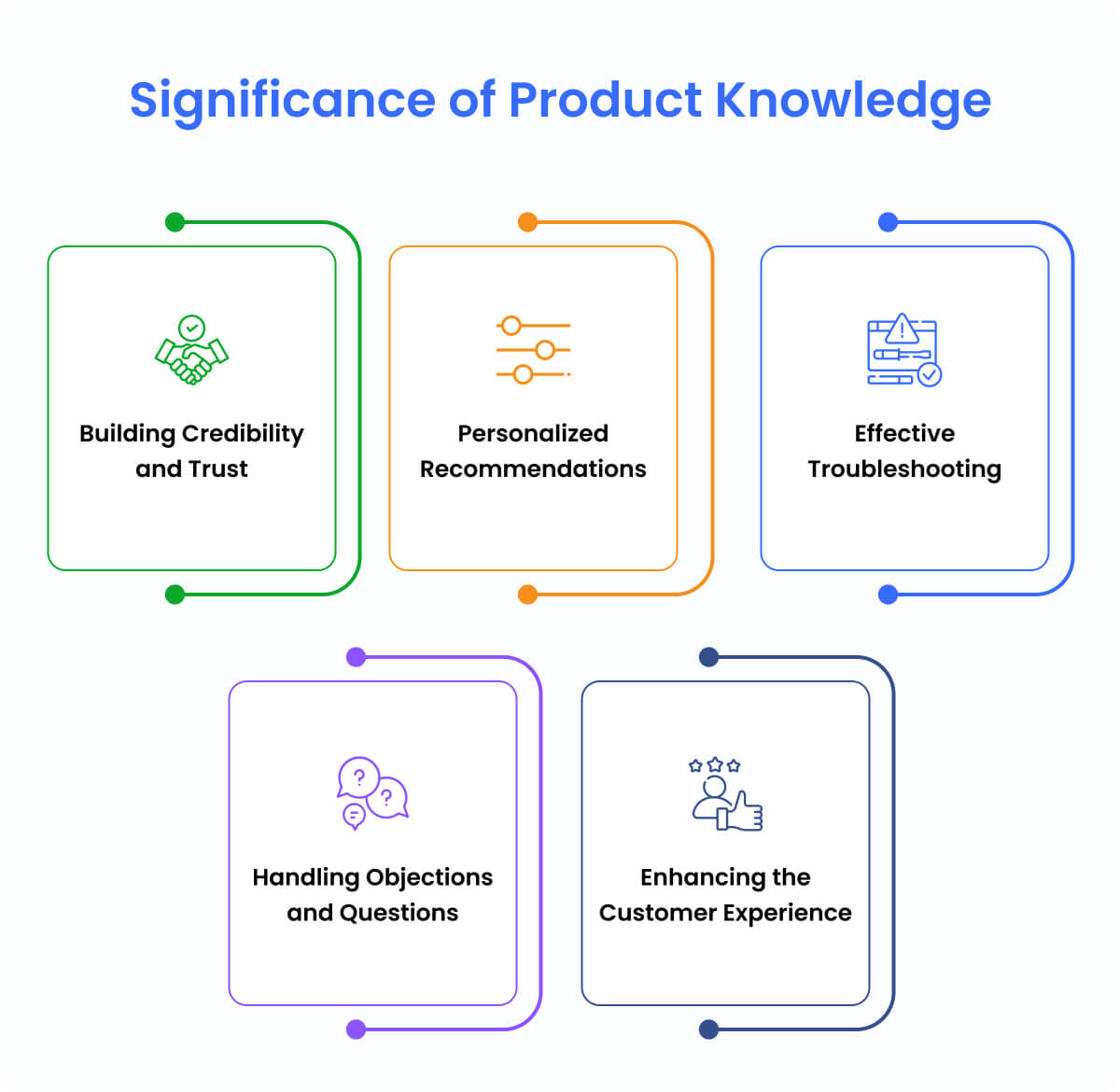
- Building Credibility and Trust: Product knowledge instills confidence in customers, demonstrating that the service provider has a comprehensive understanding of the offerings. This builds credibility and trust, as customers rely on accurate information to make informed purchasing decisions.
- Personalized Recommendations: With in-depth product knowledge, service providers can offer tailored recommendations based on the specific needs and preferences of customers. By understanding the features, benefits, and use cases of different products, they can guide customers toward the most suitable solutions.
- Effective Troubleshooting: Customers often seek assistance when facing challenges or technical issues with a product. Having a deep understanding of the product allows service providers to troubleshoot effectively, diagnose problems accurately, and provide timely solutions, saving customers time and frustration.
- Enhancing the Customer Experience: Accurate product knowledge enables service providers to offer a seamless and enriching customer experience. They can provide detailed information about product features, compatibility, warranties, and post-purchase support, helping customers make well-informed decisions and feel supported throughout their journey.
Connections between Product Knowledge and Customer Satisfaction
- According to a survey conducted by Accenture, 89% of customers get frustrated when they need to repeat their issues to multiple representatives. Having well-informed representatives who possess product knowledge helps resolve issues promptly, improving customer satisfaction.
- In a study by Statista, 71% of customers indicated that they would recommend a brand to others if they received excellent customer service, which includes accurate and helpful product information.
- Research by Salesforce revealed that 79% of customers are likely to switch to a competitor if they experience a lack of personalized product recommendations or receive inaccurate information.
- A report by McKinsey & Company highlighted that customers who have a positive experience with a knowledgeable representative are 3.5 times more likely to repurchase and recommend the company to others.
The statistics show how vital customer service strength Product knowledge is! By investing in product knowledge training, businesses can foster customer trust, satisfaction, and loyalty, leading to long-term success and growth.
6. Personalization and Customization
- Enhanced Customer Satisfaction: Personalized customer experiences cater to the unique preferences and needs of each individual, leaving them feeling valued and understood. By tailoring products, services, and interactions to their specific requirements, you create a sense of delight and satisfaction, leading to increased loyalty.
- Improved Customer Loyalty and Retention: When customers feel a genuine connection with a brand and receive personalized experiences, they are more likely to remain loyal. By consistently delivering tailored recommendations, targeted offers, and personalized communication, you cultivate a deep bond with your customers, reducing churn and fostering long-term loyalty.
- Higher Conversion Rates: When customers feel understood and supported, their purchase intent increases. Personalized recommendations and targeted offers based on their browsing history, past purchases, and preferences can significantly boost conversion rates. By showing customers that you genuinely care about their needs, you eliminate barriers and facilitate their decision-making process.
- Enhanced Brand Perception: By implementing personalized customer experiences, you position your brand as forward-thinking, customer-centric, and technologically advanced. Customers perceive your brand as attentive, innovative, and committed to delivering exceptional service. This positive brand perception not only fosters loyalty but also attracts new customers who seek personalized interactions.
Positive Impact of Personalization
- 80% of consumers are more likely to make a purchase when brands offer personalized experiences. (Epsilon)
- 91% of consumers are more likely to shop with brands that provide relevant offers and recommendations. (Accenture)
- 88% of marketers reported measurable improvements in business outcomes due to personalization. (Evergage)
- 74% of customers are more likely to switch brands if they encounter a purchasing experience that lacks personalization. (Salesforce)
- 36% of consumers expressed an interest in purchasing personalized products or services, even at a higher price point. (Deloitte)
These numerical data demonstrate the immense value of personalization and customization in customer service. Personalization not only enhances customer engagement but also drives higher conversion rates, ultimately contributing to a thriving and prosperous business.
7. Timely Responsiveness
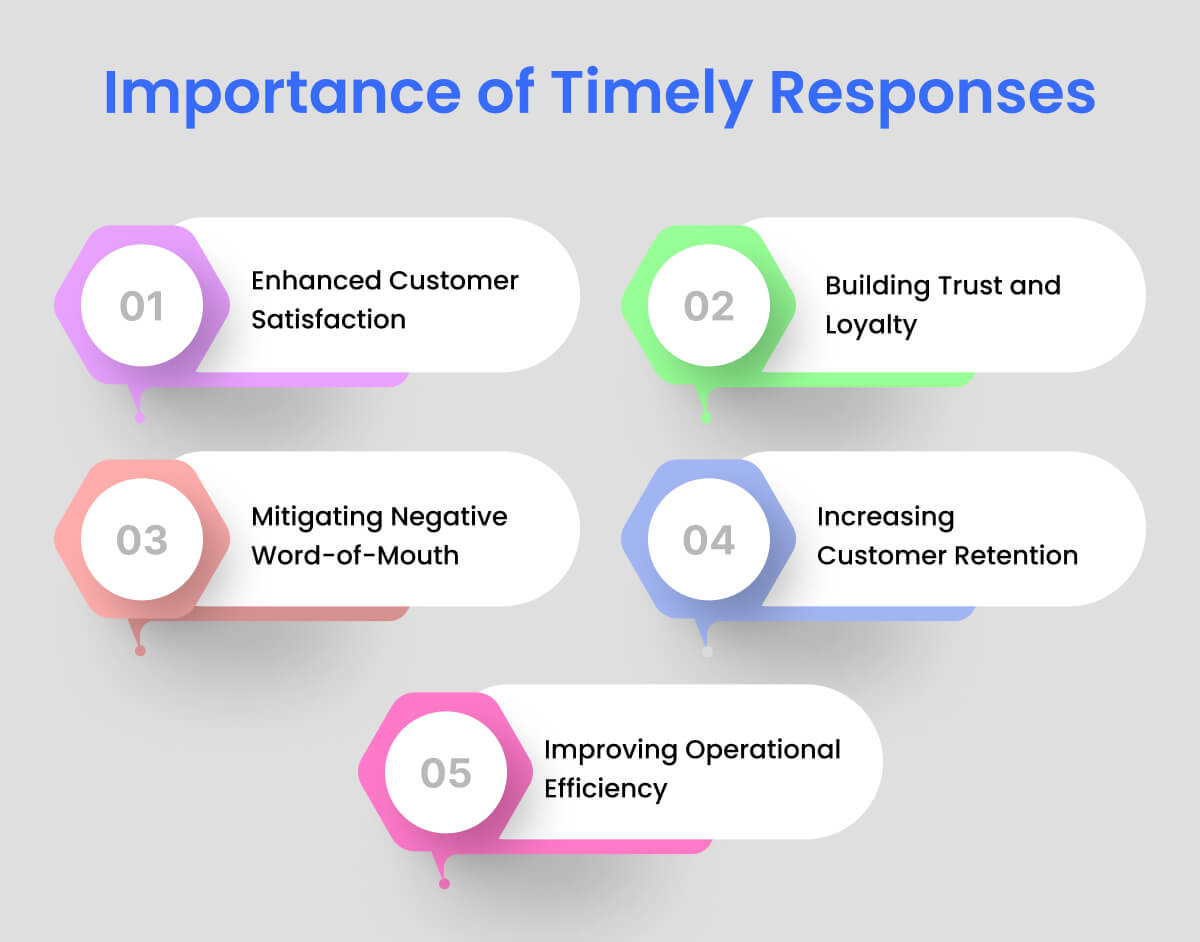
- Enhanced Customer Satisfaction: Timely responses show that you value your customers’ time and concerns. By addressing their inquiries, issues, or complaints promptly, you instill a sense of trust and satisfaction. Customers feel acknowledged and appreciated, resulting in improved overall satisfaction levels.
- Building Trust and Loyalty: Swift responses demonstrate your commitment to customer service excellence. Customers appreciate businesses that are proactive, responsive, and reliable. By promptly attending to their needs, you build trust and loyalty, fostering long-term relationships that go beyond a single transaction.
- Mitigating Negative Word-of-Mouth: Delayed responses or lack of responsiveness can lead to customer frustration and disappointment. Unsatisfied customers are more likely to share their negative experiences with others, potentially damaging your brand’s reputation. Timely responses allow you to address issues promptly, minimizing the risk of negative word-of-mouth.
- Increasing Customer Retention: When customers receive quick resolutions or answers to their queries, they are more likely to remain loyal. Timely responses help to retain customers and prevent churn. By promptly addressing their concerns, you reaffirm their decision to choose your brand and solidify their loyalty.
- Improving Operational Efficiency: Timely responsiveness is not just about meeting customer expectations; it also reflects the efficiency of your internal processes. Streamlined communication channels, well-trained staff, and robust response systems enable you to handle customer queries swiftly and effectively. This efficiency reduces backlog, optimizes resources, and ensures a seamless customer experience.
Significance of Responsiveness
- According to a study by SuperOffice, 45% of customers expect a response to their customer service inquiries within one hour.
- 90% of customers consider an immediate response “important” or “very important” when they have a customer service question. (HubSpot)
- 33% of customers said they would consider switching companies after just a single instance of poor customer service. (American Express)
- 72% of customers who experienced a live chat session with a quick response time were satisfied with the experience and were more likely to become repeat customers. (Glance)
The statistics highlight the critical role of timely responsiveness in instilling customer trust and loyalty. That is not all, responsiveness also mitigates negative word-of-mouth, increases customer retention, and optimizes operational efficiency. It helps position the business for a competitive advantage in the market.
8. Adaptability and Flexibility
- Understanding Diverse Customer Requirements: Adaptability and Flexibility require the ability to comprehend and cater to a wide range of customer needs. This involves actively listening, gathering insights, and adapting your approach to meet individual preferences, expectations, and circumstances.
- Tailoring Solutions: Being adaptable means customizing solutions to address specific customer requirements. Flexibility allows you to offer alternative options or adjust your offerings to align with changing customer demands, ensuring their needs are met effectively and satisfactorily.
- Problem-Solving Agility: Adaptability and flexibility empower you to respond swiftly and effectively to customer issues or challenges. It involves analyzing situations, thinking creatively, and adapting your problem-solving approach to meet unique circumstances, fostering customer satisfaction and loyalty.
Link Between Adaptability and Customer Loyalty
- 84% of customers say being treated like a person, not a number, is essential to winning their business. (Salesforce)
- 80% of customers are more likely to do business with a company that offers personalized experiences. (Accenture)
- 52% of customers switched brands due to poor customer service experiences. (Harvard Business)
- 73% of consumers say a positive customer experience is a crucial factor in their brand loyalty. (PwC)
- 62% of customers expect companies to adapt their customer service based on their individual needs and preferences. (Zendesk shows)
9. Proactive Customer Service
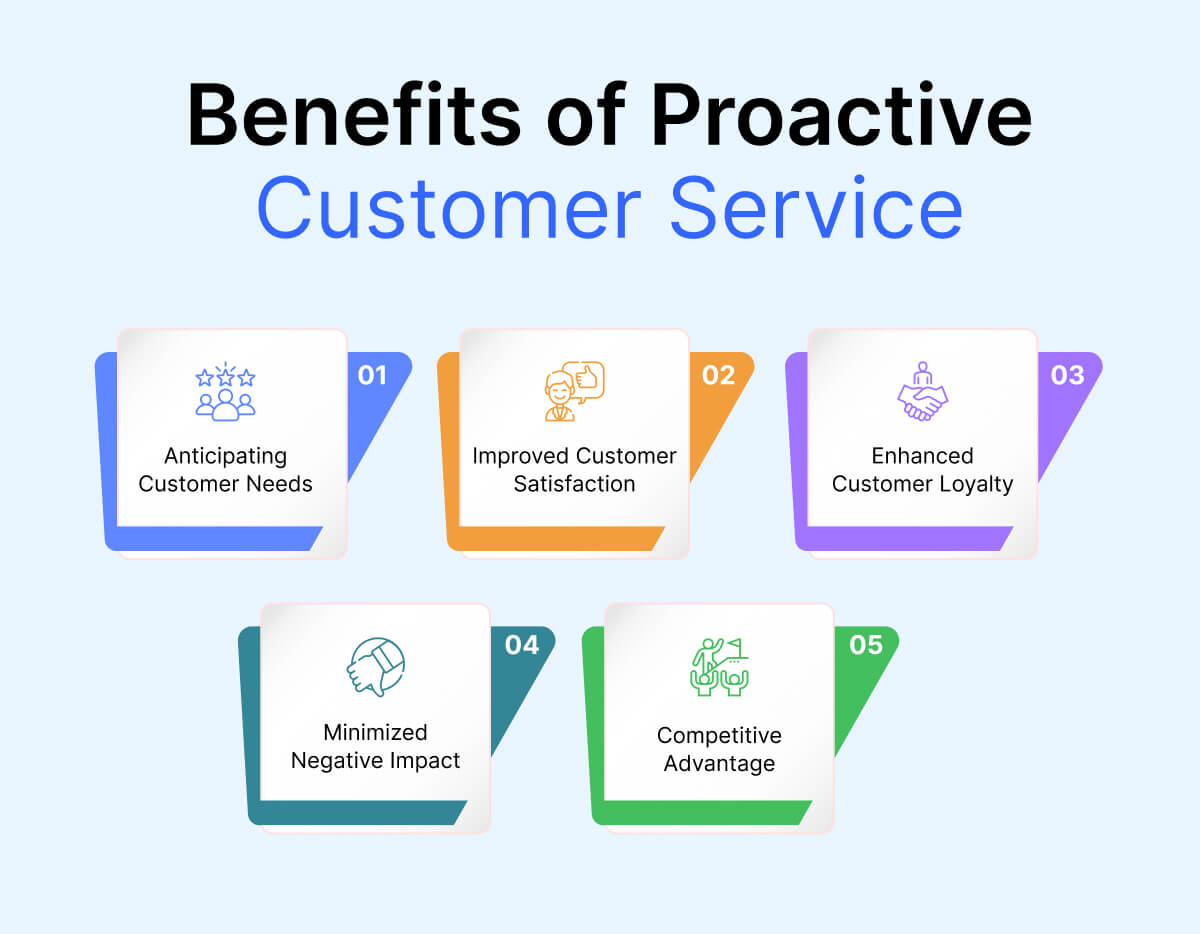
- Improved Customer Satisfaction: Proactive customer service demonstrates attentiveness and cares toward customers. By addressing potential issues proactively, businesses show a commitment to their customers’ well-being, resulting in heightened satisfaction. Customers feel valued and appreciate the proactive measures taken to ensure a seamless experience.
- Enhanced Customer Loyalty: When customers experience proactive service, they develop a deeper sense of loyalty towards the brand. By going above and beyond to identify and address potential issues, businesses build trust and foster long-term relationships. Proactive customer service creates a strong emotional connection, making customers more likely to remain loyal and advocate for the brand.
- Minimized Negative Impact: By proactively identifying and addressing potential issues, businesses can prevent problems from escalating and negatively impacting the customer experience. Swift resolution of potential issues reduces customer frustration, saves time, and preserves the brand’s reputation. Proactive customer service helps businesses maintain a positive image and avoid potential pitfalls.
Positive Outcomes of Proactive Customer Service
- 77% of customers have chosen, recommended, or paid more for a brand that provides a personalized, proactive customer experience. (Forrester)
- 15% higher customer retention rate compared to those with a reactive approach. (Aberdeen Group)
- 86% of customers said they were more likely to do business with a company that offers proactive customer service. (Harris Interactive)
- 48% of customers who experienced proactive customer service became loyal advocates for the brand. (Accenture)
- 3.5 times higher year-over-year growth in customer satisfaction rates compared to those that rely solely on reactive service. (Salesforce)
These statistics highlight how smart it is to be proactive in the case of providing service to customers. Through proactivity, businesses demonstrate a genuine commitment to customer satisfaction. It also helps encourage repeat business and generate positive word-of-mouth referrals.
10. Continuous Improvement and Feedback Incorporation
- Identifying Areas for Improvement: Customer feedback provides valuable insights into areas where a business can enhance its products, services, and overall customer experience. By actively seeking feedback, businesses can pinpoint specific pain points or opportunities for improvement, allowing for targeted and effective enhancements.
- Customer-Centric Approach: Seeking customer feedback demonstrates a customer-centric approach. It shows that the business values its customers’ opinions and actively seeks to incorporate their feedback to meet their needs better. This fosters a sense of collaboration and partnership, strengthening the relationship between the business and its customers.
- Driving Innovation: Customer feedback often unveils new ideas, perspectives, and insights that can fuel innovation. This fosters a culture of innovation and positions the business as a leader in its industry.
- Building Customer Loyalty: Seeking and utilizing customer feedback creates a feedback loop that promotes customer loyalty. Customers appreciate businesses that actively listen, respond, and act upon their feedback.
Impact of Customer Feedback on Service Enhancement
- 90% of customers stated that their buying decisions are influenced by online reviews and customer feedback. (Dimensional Research)
- 77% of customers have a more favorable view of companies that proactively ask for and act on customer feedback. (Microsoft)
- 68% of customers believe that a company’s willingness to collect and act upon feedback is indicative of how much they value their customers. (Qualtrics)
- In a study by Bain & Company, it was revealed that companies that actively utilize customer feedback see, on average, a 10-15% increase in revenue and a 20% increase in customer retention.
- 69% of customers said that their perception of a company’s customer service is influenced by how quickly they respond to and resolve customer feedback. (HubSpot)
Final Thoughts
All in all, prioritizing and developing customer service strengths is crucial for businesses to thrive in today’s competitive landscape. By focusing on delivering personalized, efficient, and empathetic support, companies can differentiate themselves and cultivate long-lasting customer relationships.
Ultimately, the companies that prioritize customer service as a strategic imperative and consistently deliver exceptional experiences. It will emerge as leaders in their industries, foster customer loyalty, and drive long-term business success.
This is Kawser Md Sayem, and I would like to introduce myself as a content writer. It has been five years since I began my professional writing journey. By this time, I have had the pleasure of working in unidentical industries like publishing, information technology, entertainment, and education
 Customer Service
Customer Service







